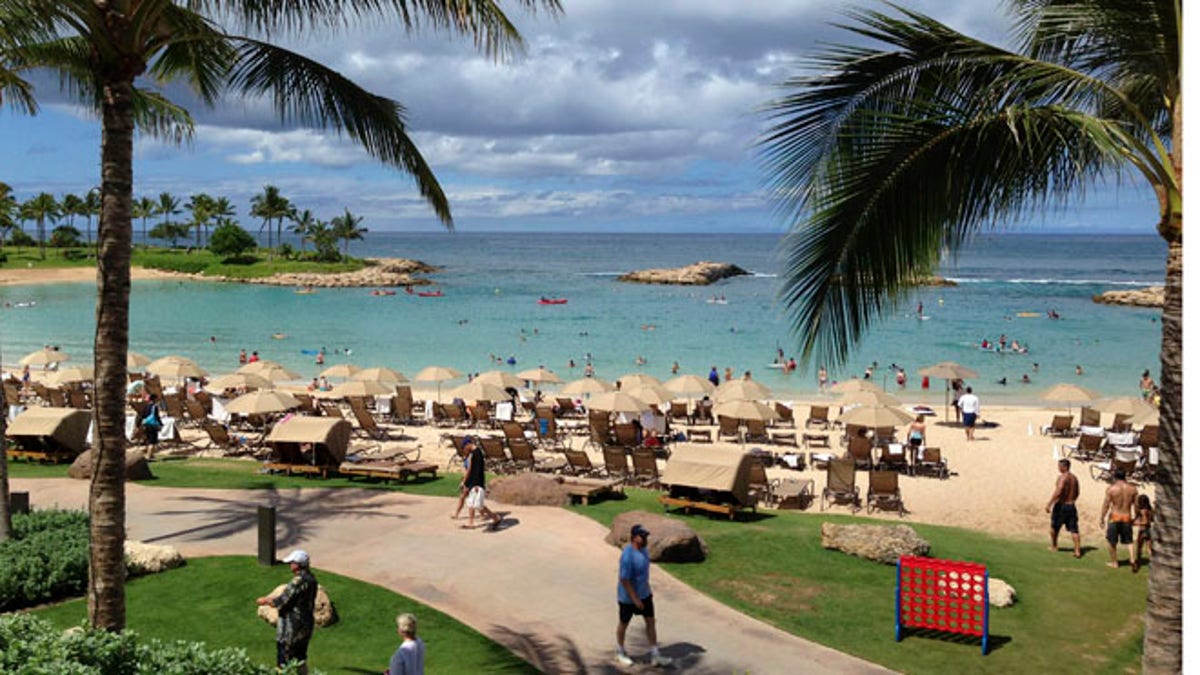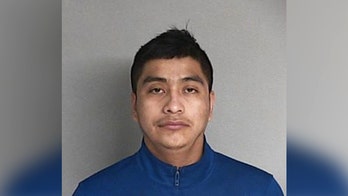
July 29, 2013: Tourists and locals play on Ko'Olina beach on the island of Oahu, Hawaii. (Reuters)
Lawmakers in the Aloha State want to wave goodbye to their growing homeless population -- by buying them a one-way ticket off the island.
Hawaii's controversial three-year “Return to Home” pilot program launches later this year and is being billed as a way to help the state’s 17,000 homeless residents, while reducing the financial burden the state has in caring for them. Under the plan, the state will pay for a one-way plane ticket for any homeless resident who can find someone on the mainland to take them in.
The program, which has a $100,000 annual budget, is the brainchild of state Rep. John Mizuno, who had unsuccessfully tried to get a similar plan through the past three legislative sessions. This year, the measure was attached to a larger spending bill and squeaked through the state legislature.
Critics, though, say the program is a quick fix and does nothing to address the root causes of homelessness.
Patricia McManaman, director of the Department of Human Services – the agency tasked with implementing the program -- told lawmakers she had reservations about the plan to send the state’s homeless away and questioned the program’s funding. She also had a problem with language in the bill that suggests homeless people are in need of “sufficient personal hygiene” in order to travel – something she calls an “unnecessary and inappropriate stereotype.”
But Mizuno argues it’s time the state get on board with a plan that he claims can help up to 100 homeless Hawaiians a year.
In 2010, Mizuno along with state Rep. Rida Cabanilla failed to sway lawmakers. But what they did next shocked many. Both Mizuno and Cabanilla started soliciting funds to send the homeless away anyway on a case-by-case basis. Mizuno chipped in $100 of his own money to buy a one-way plane ticket to send homeless man Gregory Reese back to Seattle, Wash.
That didn’t sit well with John Fox, director of the Seattle Displacement Coalition, who told the Honolulu Star-Advertiser, he had never heard of elected officials using their own money to send a homeless person back to his or her home state.
But Hawaii’s relocation plan isn’t a new idea. It is fashioned after a New York City program implemented six years ago. The Mayor Michael Bloomberg-backed plan bought hundreds of homeless families bus tickets, train rides and airfare so they could leave the city.
According to the latest figures available, New York City spent at least $500,000 annually on Project Reconnect. From 2007 to 2009, the Bloomberg administration, which has struggled with homelessness, sent more than 550 families packing. They argue that sending away families is a lot less expensive than housing them in shelters which cost the city more than $36,000 a year per family.
In Baton Rouge, La., the city’s Metro Council approved a measure to send its 800 homeless residents out of the area. Officials initially named the program “Clean Sweep” but quickly changed it to the Homeless Outreach Prevent Efforts – or HOPE – after people started complaining that “Clean Sweep” seemed like the city was comparing its homeless to trash. The council approved $5,000 for the trial program which they say is enough for 30 bus tickets.
In San Francisco, you don’t even need to be homeless to qualify. The city’s Homeward Bound Program provides bus tickets for low-income residents who can’t afford to move themselves.
To qualify, a person must live in San Francisco, have family or friends who will vouch to take them in, and be medically stable and sober. Personal hygiene “must be at an acceptable level to travel,” although the city’s Human Service Agency, which runs the program, provides clothing and shower facilities to people before they board the bus.
City commissioners in Fort Lauderdale, Fla., recently green-lighted a $25,000 program to get the homeless out of their area. Funding for The Homeless Reunification Program is taken out of the Florida Law Enforcement Trust Fund, which is made up of money confiscated by criminals.
Similar programs were also started in Florida’s Palm Beach County and West Palm Beach.
More than 7,000 homeless people were placed in shelters and low-income housing units in Fort Lauderdale from January-August 2011.




